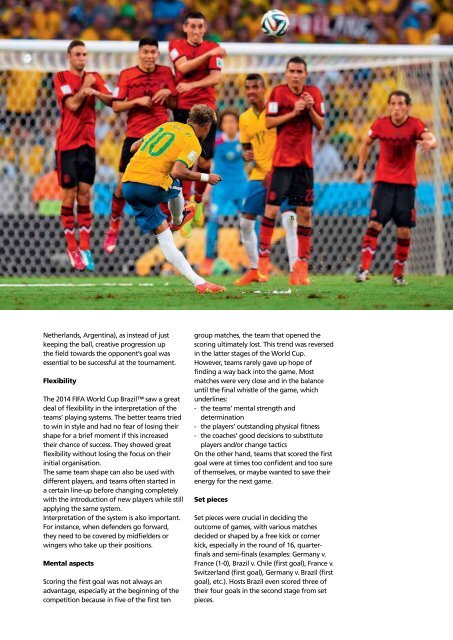2014fwc_tsg_report_15082014_neutral
2014fwc_tsg_report_15082014_neutral
2014fwc_tsg_report_15082014_neutral
You also want an ePaper? Increase the reach of your titles
YUMPU automatically turns print PDFs into web optimized ePapers that Google loves.
46<br />
Technical and tactical analysis<br />
Netherlands, Argentina), as instead of just<br />
keeping the ball, creative progression up<br />
the field towards the opponent’s goal was<br />
essential to be successful at the tournament.<br />
Flexibility<br />
The 2014 FIFA World Cup Brazil saw a great<br />
deal of flexibility in the interpretation of the<br />
teams’ playing systems. The better teams tried<br />
to win in style and had no fear of losing their<br />
shape for a brief moment if this increased<br />
their chance of success. They showed great<br />
flexibility without losing the focus on their<br />
initial organisation.<br />
The same team shape can also be used with<br />
different players, and teams often started in<br />
a certain line-up before changing completely<br />
with the introduction of new players while still<br />
applying the same system.<br />
Interpretation of the system is also important.<br />
For instance, when defenders go forward,<br />
they need to be covered by midfielders or<br />
wingers who take up their positions.<br />
Mental aspects<br />
Scoring the first goal was not always an<br />
advantage, especially at the beginning of the<br />
competition because in five of the first ten<br />
group matches, the team that opened the<br />
scoring ultimately lost. This trend was reversed<br />
in the latter stages of the World Cup.<br />
However, teams rarely gave up hope of<br />
finding a way back into the game. Most<br />
matches were very close and in the balance<br />
until the final whistle of the game, which<br />
underlines:<br />
- the teams’ mental strength and<br />
determination<br />
- the players’ outstanding physical fitness<br />
- the coaches’ good decisions to substitute<br />
players and/or change tactics<br />
On the other hand, teams that scored the first<br />
goal were at times too confident and too sure<br />
of themselves, or maybe wanted to save their<br />
energy for the next game.<br />
Set pieces<br />
Set pieces were crucial in deciding the<br />
outcome of games, with various matches<br />
decided or shaped by a free kick or corner<br />
kick, especially in the round of 16, quarterfinals<br />
and semi-finals (examples: Germany v.<br />
France (1-0), Brazil v. Chile (first goal), France v.<br />
Switzerland (first goal), Germany v. Brazil (first<br />
goal), etc.). Hosts Brazil even scored three of<br />
their four goals in the second stage from set<br />
pieces.


